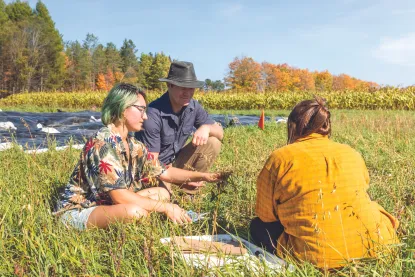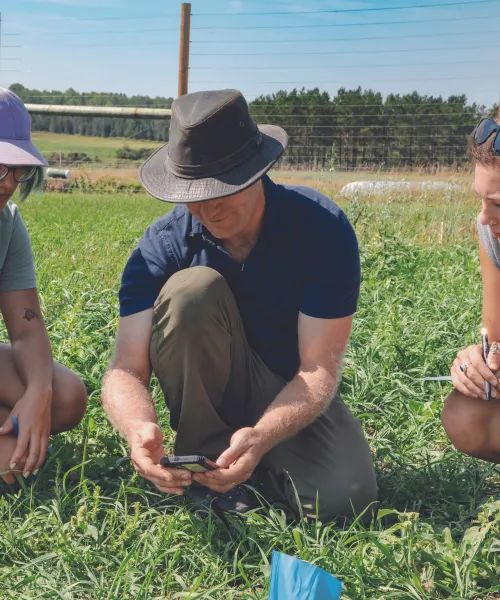By Kristi Evans
The number of small, diversified farms using organic practices to grow specialty crops has increased in the Upper Peninsula—defying the national trend toward fewer and larger farms. Traditionally in organic systems, tillage was about the only option to manage weeds, incorporate soil amendments, prep a bed for the next crop or terminate a cover crop, said James DeDecker, director of the Michigan State University Extension Upper Peninsula Research and Extension Center (MSU-UPREC). Available organic herbicides are not commonly used because they are expensive and not always effective.
“Now we’re seeing farmers implement tarping—covering the ground with an opaque plastic to facilitate residue breakdown and increase the tilth of their topsoil—as an alternative technique for achieving their management goals without any real disturbance of the soil,” DeDecker added. “In some cases, they just pull the tarp off and start planting, or perhaps add compost first.”
Ongoing sustainable agriculture-focused research at MSU-UPREC’s North Farm in Chatham is directly informed by the innovative methods used by regional farmers. DeDecker and NMU alumna Sarah Hayward '12 BFA, North Farm coordinator, were eager to partner with NMU Professor Matthew Van Grinsven '06 BS on a project that investigates alternative tillage and cover crop management practices in an organic setting. Several NMU undergraduate students are involved in the research.
“We are monitoring four cover crop termination methods in terms of their greenhouse gas emissions, soil health, weed and disease occurrence, and ultimately crop quality and yields,” said Van Grinsven, a faculty member in the Earth, Environmental and Geographical Sciences (EEGS) Department. “There are 16 plots total—four for each method: rolling and crimping; mowing and conventional tillage; mowing and tarping; and an unterminated, untreated control. All were established in a previously uncultivated field area.”
Hayward is in her third growing season at the North Farm. While pursuing her art and design degree with a concentration in painting and drawing, she worked at the Marquette Food Co-op and at a couple of organic farms. Both ignited her passion for the local food system and set her on a divergent career path.
“In organic agriculture, there’s an increased emphasis on integrating no-till practices,” Hayward said. “We’re curious how to do less tilling on the North Farm, so when I learned through a casual conversation with Matt about his expertise and interest in studying that, we wanted to come up with a way to work together. The opportunity presented itself thanks to good timing. We were putting in a new field, so we worked the ground and planted a cover crop. It was like a blank canvas for Matt and his students to work on.”
Through the EEGS Department, Van Grinsven has access to two field portable trace gas analyzers. One is set up to measure nitrous oxide and the other monitors carbon dioxide and methane emissions.
“The second you remove soil from the environment, it’s no longer representative of the system it was in,” he said. “It’s more robust and real to do the work onsite. Also, it forces everyone to be here at the farm, which is great because the students are gaining applied research experience. I’ve received lots of positive feedback from them and our partners at MSU-UPREC. It’s rewarding to be involved in something that directly benefits regional farmers and may guide their management practices through scientifically sound, publishable research. It’s nice to mesh all of that together.”
 Katarina Rothhorn is an environmental science major with a concentration in water quality who is gaining four internship credits through her participation (pictured left, with fellow student Silas Pickhardt above). On the day of the interviews in mid-October, she was positioning the trace gas analyzers on two soil collars within each plot and inserting their probes into the ground. Rothhorn connected to the high-precision instruments with an Android unit through a web interface while sequentially collecting observations of greenhouse gas emissions.
Katarina Rothhorn is an environmental science major with a concentration in water quality who is gaining four internship credits through her participation (pictured left, with fellow student Silas Pickhardt above). On the day of the interviews in mid-October, she was positioning the trace gas analyzers on two soil collars within each plot and inserting their probes into the ground. Rothhorn connected to the high-precision instruments with an Android unit through a web interface while sequentially collecting observations of greenhouse gas emissions.
“It’s good to learn how to use these instruments and gain some experience with them for future job opportunities,” she said. “I’ve been spending a day here every other week collecting gas samples, but I also was part of a fall biomass collection team. Later this semester, I’ll be helping with data analysis and analyzing soil samples in the lab. Not a lot of research has been done on these alternative methods, particularly tarping. It’s exciting and fun to explore that. Research is something I’m interested in, and I appreciate the specific, formal structure of this project.”
Others with NMU connections involved in the collaboration with MSU-UPREC are student Olivia Maynard and alumni Elizabeth Armstrong '22 BS and Abbey Palmer '08 BA.
Preliminary results are scheduled to be presented in February at the Marbleseed Organic Farming Conference in Wisconsin. The team is hopeful that the results will help local farmers and others across the Midwest identify ways to enhance productivity and sustainability on small, diversified farms using locally relevant, research-based information.
Image

"The students are doing a phenomenal job organizing and archiving the data. This is the first year of what’s planned to be a multi-year investigation. And we didn’t need a lot of start-up funding beyond some institutional support to launch this rigorous, comprehensive project.”
- NMU Professor Matthew Van Grinsven '06 BS
